Dogs


The Cesky Terrier is a small terrier type dog originating in Czechoslovakia. The name is pronounced CHESS-kee (after its Czech name Český teriér, literally Czech Terrier).

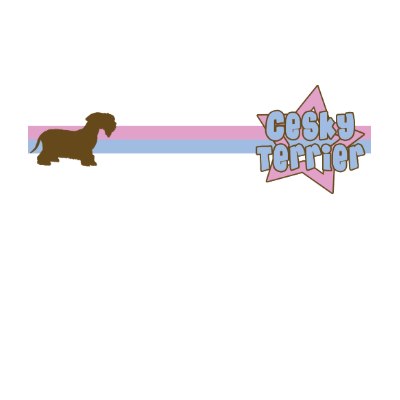
History

The Český Terrier was created by a Czech breeder, František Horák, in 1948, as a cross between a Sealyham Terrier and a Scottish Terrier, to create a terrier suitable for hunting in the forests of Bohemia. Although not a trained scientist, Horák worked for many years as a research assistant at the Czechoslovak Academy of Science, and used knowledge gained there in his dog breeding. Czechoslovakia was ruled by a Communist regime, and as Horák's dogs became more popular around the world, he received visits from the secret police due to the large volume of mail he was getting from outside the country. František Horák died in 1997.
The Český Terrier was recognized for international competition by the Fédération Cynologique Internationale in 1963 as breed number 246 in Group 3, Terriers. The breed is now recognized by all of the major kennel clubs in the English-speaking world. The cesky terrier is one of the six most rare dog breeds worldwide.
Appearance
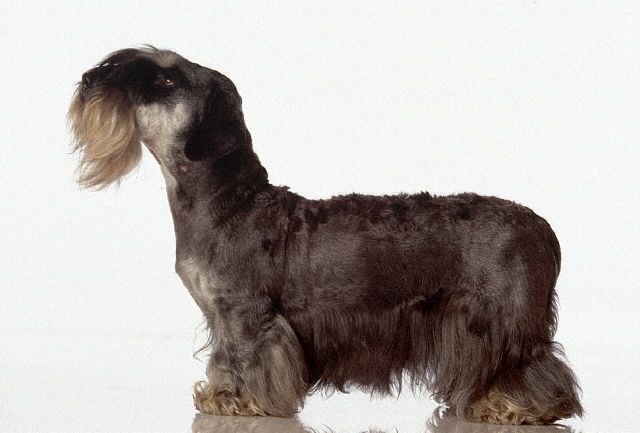
The Cesky Terrier is short-legged (achondroplastic dwarf) and moderately long-bodied, resembling the Sealyham Terrier and the Scottish Terrier.
The Cesky Terrier has a long head, bushy beard, mustache, and eyebrows. The body is solid, but not heavy. The wavy, silky coat usually comes in various shades of gray-blue with tan, gray, white, or yellow furnishings or light coffee, though puppies are born black. The coat lightens between birth and two years of age.
The Cesky Terrier's eyes are brown in gray-blue dogs and yellow in brown dogs. The noses and lips of blue-gray dogs are black; for brown dogs it is liver. The ears are triangular, folding forward close to the head. The head is long, but not too wide, with a well-defined stop.
Temperament 1
The breed standard calls for a calm dog, and aggression is a disqualifying fault. Cesky teriers are reputed to be less active and quieter than other terriers. This may or may not make them suitable pets for families with children.
Care
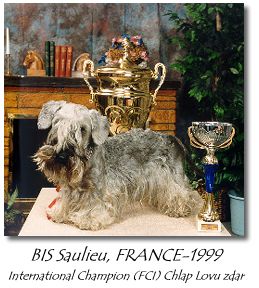
The coat of the Cesky Terrier is not stripped (dead hair pulled out with the fingers or a special knife) as in other terriers, but rather is clippered. The body and tail are clipped, and the furnishings (hair that hangs down under the body) are left long, as is the hair on the lower legs and on the face (eyebrows, beard, and moustache.) The longer hair should be brushed daily.
Description
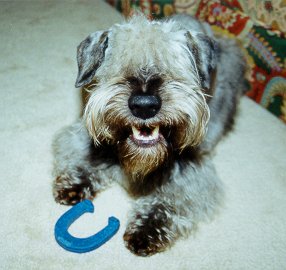
The Cesky Terrier, also called the Bohemian Terrier, is a short-legged, moderately long dog. It looks similar to a Sealyham Terrier. The wedge-shaped head is about 7-8 inches (17-20 cm.) long and 3-4 inches (7-10 cm.) wide, with a bushy beard, mustache and eyebrows. The bridge of the nasal is straight with a small stop. The nose is black in gray dogs and liver-colored in brown dogs. The teeth meet in a scissors or level bite. The tail is 7-8 inches (17-20 cm.) long. The medium- sized almond shaped eyes are dark brown in gray colored dogs, and a lighter brown in brown dogs. The high-set ears are triangular, folding forward close to the head. Dewclaws may or may not be removed. The long, silky coat is slightly wavy. Puppies are born black, black and tan or brown. When the dog reaches about 2-3 years old the adult coat color will be set and is shades of gray to a dark charcoal to platinum gray. Sometimes black appears on the head, ears, feet and tail. The head, beard, cheeks, neck, chest, limbs and around the vent may have white, coffee, brown or yellow markings. The light coffee color is quite rare. The tail may have a white tip or collar.
Temperament 2

The Cesky Terrier is patient, playful, sporty yet calm. A sweet and joyful dog that is good with children. They are brave, loyal, obedient, courageous dogs. Intelligent, very trainable and easy to handle. It is important to socialize them while they are a puppy, letting them meet with various people and different animals in positive circumstances to experience a variety of situations. This will help them be well adjusted so they can grow up to be a happy adult. They love people, especially children and are fairly friendly with strangers, but like most terriers, if you are not 100% pack leader, it can be feisty, stubborn and fearless. This sociable dog gets along well with other dogs and with other household animals. The Cesky travels well. It is an excellent companion dog that is capable of playing with children, yet at the same time being an attentive and threatening house guard. Make sure you are this dog's firm, confident, consistent pack leader to avoid Small Dog Syndrome, human induced behavior problems. Always remember, dogs are canines, not humans. Be sure to meet their natural instinct as animals.

Height, Weight
Height: 10-13 inches (25-32 cm.)
Weight: 13-23 pounds (6-10 kg.)
Health Problems
Generally healthy. Some are prone to Scottie Cramp Syndrome, sometimes called Wobbly Scottie, which causes the dog to walk in an awkward movement.
Living Conditions
The Cesky Terrier is a good dog for apartment life. They are moderately active indoors and will do okay without a yard.
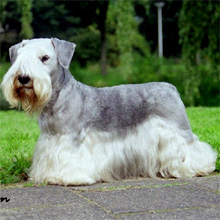
Exercise
The Cesky Terrier enjoys running and playing through a wooded area or open countryside. They also need a long daily walk on or off the lead, but always in a safe area. They are small, but will make a fairly good jogging companion. Ceskys have an average demand for exercise.
Life Expectancy
About 12-15 years.
Grooming
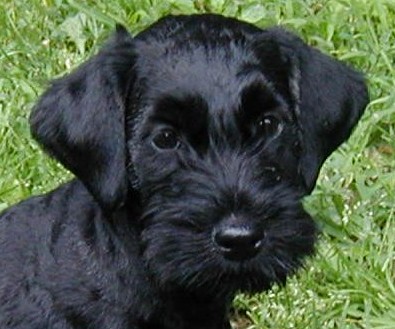
The Cesky should be trimmed regularly, leaving the hair long on the stomach and legs and around the face to form the moustache, beard, and eyebrows. For pet dogs it will need to be trimmed at least four times a year. Show dogs require more frequent grooming. Unlike most other terriers the Cesky is generally clipped with electric clippers, instead of being stripped. The longer hair needs to be brushed and combed at least twice a week, depending on the condition of the coat, to prevent tangles. Clip the excess hair between the pads of the feet and remove loose hair in the ear passages. This breed sheds little to no hair.
Origin
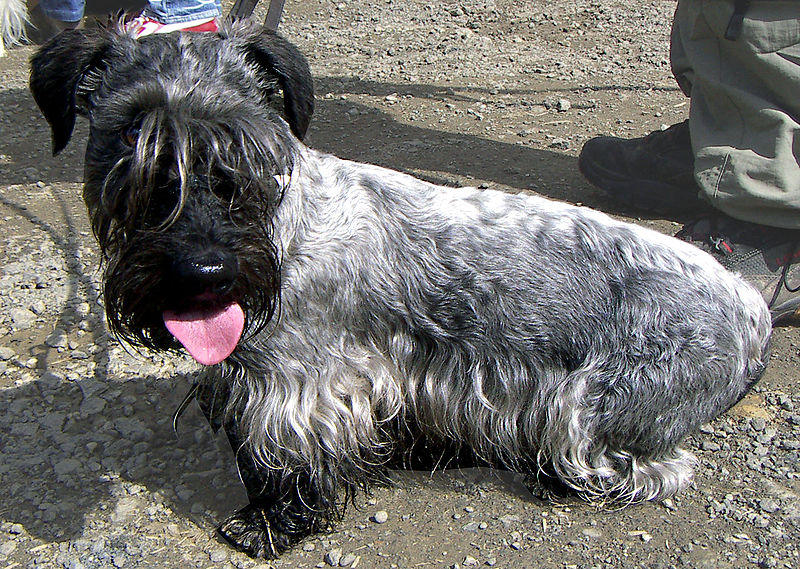
A relatively new breed the Cesky Terrier was developed from crosses among the Sealyham, Scottish Terrier and possibly with the Dandie Dinmont. The dogs original developer was a Czechoslovakian breeder named Frantisek Horak who was successful at getting them recognized by the FCI in 1963. Mr. Horak's goal was to breed a dog whom was narrow enough to successfully get down into the dens and burrows to hunt rats, and fox. By the 1980s breeders felt the Cesky Terrier no longer looked like the dogs Mr. Horak bred, so they crossed them yet again with Sealyham Terriers. The breed was first imported to the USA in 1987 and to this day are quite rare. By 1993 there were said to be only about 150 Cesky Terriers in the USA. The breed may be shown at the National Cesky Terrier Club, rare breed shows, state kennel club and at some FCI and UKC shows. The Cesky Terrier is a good hunter, tracker, watch and guard dog.



- Dandie Dinmont Terrier Small Dog Breed
A Dandie Dinmont Terrier is a small breed of dog in the terrier family. The breed has a very long body, short legs, and a distinctive "top-knot" of hair on the head. Description 1 Appearance Originally bred to go to ground, the Dandie Dinmont Terrier...
- Brazilian Terrier Small Dog Breed
The Brazilian Terrier, commonly called Fox Paulistinha, is a breed of dog developed in Brazil. It is one of several terriers probably descended from the combining of the Fox Terrier with other small breeds. Appearance This terrier stands between 14-16...
- Australian Terrier Small Dog Breed
The Australian Terrier is a small sized breed of dog of the terrier dog type. The breed was developed in Australia, although the ancestral types of dogs from which the breed descends were from Great Britain. Appearance The Australian Terrier is a...
- Best House Dogs
The very fact that you are reading this article means that you are giving the breed and the kind of dog to get for your home, a serious thought. You want the decision to be absolutely correct and for that, you need information about the kinds of...
- Types Of Small House Dogs
Many people love to have a pet dog around the house. They are great stress busters and makes one smile. But, with constraint of place, one thinks twice before bringing home a pet dog. Families or single people with small apartments can opt for small...
Dogs
Cesky Terrier small breed dog





The Český Terrier was recognized for international competition by the Fédération Cynologique Internationale in 1963 as breed number 246 in Group 3, Terriers. The breed is now recognized by all of the major kennel clubs in the English-speaking world. The cesky terrier is one of the six most rare dog breeds worldwide.
Appearance

The Cesky Terrier has a long head, bushy beard, mustache, and eyebrows. The body is solid, but not heavy. The wavy, silky coat usually comes in various shades of gray-blue with tan, gray, white, or yellow furnishings or light coffee, though puppies are born black. The coat lightens between birth and two years of age.
The Cesky Terrier's eyes are brown in gray-blue dogs and yellow in brown dogs. The noses and lips of blue-gray dogs are black; for brown dogs it is liver. The ears are triangular, folding forward close to the head. The head is long, but not too wide, with a well-defined stop.
Temperament 1
The breed standard calls for a calm dog, and aggression is a disqualifying fault. Cesky teriers are reputed to be less active and quieter than other terriers. This may or may not make them suitable pets for families with children.
Care

Description

Temperament 2

Height: 10-13 inches (25-32 cm.)
Weight: 13-23 pounds (6-10 kg.)
Health Problems
Generally healthy. Some are prone to Scottie Cramp Syndrome, sometimes called Wobbly Scottie, which causes the dog to walk in an awkward movement.
Living Conditions
The Cesky Terrier is a good dog for apartment life. They are moderately active indoors and will do okay without a yard.

The Cesky Terrier enjoys running and playing through a wooded area or open countryside. They also need a long daily walk on or off the lead, but always in a safe area. They are small, but will make a fairly good jogging companion. Ceskys have an average demand for exercise.
Life Expectancy
About 12-15 years.
Grooming

Origin



- Dandie Dinmont Terrier Small Dog Breed
A Dandie Dinmont Terrier is a small breed of dog in the terrier family. The breed has a very long body, short legs, and a distinctive "top-knot" of hair on the head. Description 1 Appearance Originally bred to go to ground, the Dandie Dinmont Terrier...
- Brazilian Terrier Small Dog Breed
The Brazilian Terrier, commonly called Fox Paulistinha, is a breed of dog developed in Brazil. It is one of several terriers probably descended from the combining of the Fox Terrier with other small breeds. Appearance This terrier stands between 14-16...
- Australian Terrier Small Dog Breed
The Australian Terrier is a small sized breed of dog of the terrier dog type. The breed was developed in Australia, although the ancestral types of dogs from which the breed descends were from Great Britain. Appearance The Australian Terrier is a...
- Best House Dogs
The very fact that you are reading this article means that you are giving the breed and the kind of dog to get for your home, a serious thought. You want the decision to be absolutely correct and for that, you need information about the kinds of...
- Types Of Small House Dogs
Many people love to have a pet dog around the house. They are great stress busters and makes one smile. But, with constraint of place, one thinks twice before bringing home a pet dog. Families or single people with small apartments can opt for small...
